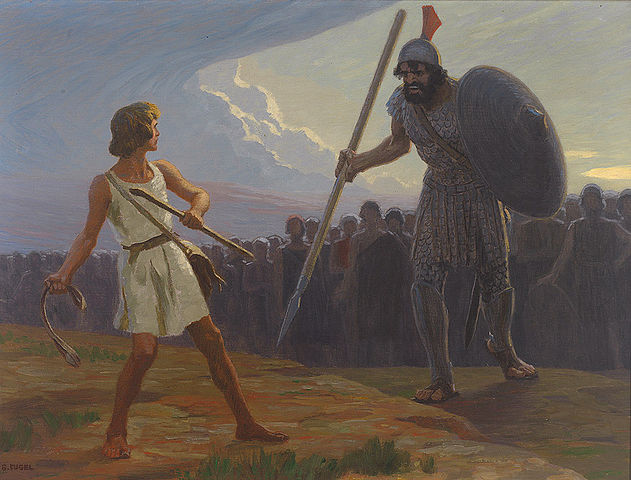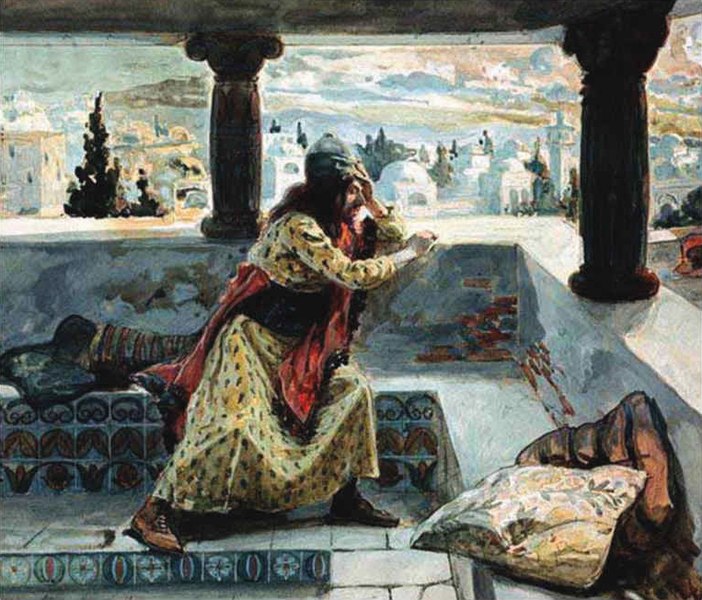King David, a pivotal figure in the Bible, was born in Bethlehem around 1040 BCE. He began as a shepherd before being anointed as the future king by the prophet Samuel. His life journey took him from shepherd to victorious warrior, from fugitive to king, and from a composer of Psalms to a unifying leader.
David’s legacy is marked by his defeat of Goliath, service in King Saul’s court, and reign as Israel’s second king. He achieved military conquests, established Jerusalem as the capital, and authored many Psalms that continue to inspire.
Despite challenges, including his affair with Bathsheba, David’s deep faith and leadership have left a lasting impact on religion and culture. In this exploration, we delve into his life and defining moments.
| Event | Date (Estimates) | Details |
|---|---|---|
| Birth and Early Life | Approx. 1040 BCE | Born in Bethlehem, youngest son of Jesse. |
| Anointed as King | Approx. 1010 BCE | Anointed by Prophet Samuel as future king. |
| Defeating Goliath | Exact date uncertain | Famously defeated the Philistine giant Goliath. |
| Service in Saul’s Court | Exact date uncertain | Served in King Saul’s court as a musician and commander. |
| Fleeing from Saul | Exact date uncertain | Fled from Saul’s jealousy and became a fugitive. |
| Anointed as King of Judah | Approx. 1005 BCE | Anointed as king of Judah, reigning from Hebron. |
| Reign as King of All Israel | Approx. 998 BCE | United northern and southern tribes, established Jerusalem as capital. |
| Conquests and Expansion | Exact dates uncertain | Engaged in various military campaigns to expand Israel’s borders. |
| Adultery with Bathsheba | Exact date uncertain | David’s affair with Bathsheba caused trouble in his household. |
| Solomon’s Birth | Exact date uncertain | Solomon, David’s son with Bathsheba, was born. |
| The Psalms | Exact dates uncertain | Traditionally attributed with writing many Psalms in the Bible. |
| Death | Approx. 970 BCE | Died and was buried in Jerusalem. |
Timeline of King David in the Bible
1. Birth and Early Life (Approx. 1040 BCE):
King David was born in Bethlehem, a small town in ancient Israel. He was the youngest son of Jesse, a shepherd, and his wife.
As a young boy, David worked as a shepherd, tending to his father’s flock of sheep. This early experience as a shepherd would later serve as a metaphor in some of the Psalms he wrote, where he referred to God as his shepherd.
Also Read: Facts About King David
Little did anyone know at the time that this shepherd boy would grow up to become one of the most famous and revered kings in Israel’s history.

2. Anointed as King (Approx. 1010 BCE):
David’s anointing as the future king of Israel is a pivotal moment in his life. It took place when he was still quite young, likely in his late teens or early twenties.
The prophet Samuel, acting on God’s guidance, visited Jesse’s household to anoint the next king of Israel. Although David was the youngest of Jesse’s sons and not initially considered by his father, Samuel saw something special in him and anointed him with oil, signifying God’s choice.
Also Read: David and Goliath Facts
This anointing set in motion the events that would eventually lead to David ascending to the throne, but it also brought challenges, including his interactions with King Saul, who grew jealous of David’s popularity and saw him as a threat to his own rule.
3. Defeating Goliath (Exact date uncertain):
One of the most famous stories about David from his youth is his confrontation with the Philistine giant named Goliath.
Goliath was a formidable warrior who challenged the Israelites to send out a champion to fight him in single combat. The Philistines and Israelites were at an impasse in their battle, and the Israelites were filled with fear.
David, who had come to the Israelite camp to bring supplies for his brothers, heard Goliath’s taunts and volunteered to fight him. Despite his youth and lack of traditional armor, David had strong faith and believed that God would deliver him.
Armed with only a sling and a stone, David confronted Goliath and struck him down with a well-aimed shot to the forehead. This remarkable victory made David a hero and marked him as a man of great courage and faith.
4. Service in Saul’s Court (Exact date uncertain):
After David’s anointing as the future king by the prophet Samuel, he entered into the service of King Saul, the reigning king of Israel at the time.
David was initially brought to Saul’s court as a musician to play the harp. His music was said to have a soothing effect on Saul, who suffered from bouts of distress and melancholy.
Over time, David’s talents and character gained him favor in the king’s court, and he was appointed as a military commander. He successfully led Israelite forces in battles against their enemies, including the Philistines.
Despite his loyalty and service to Saul, as David’s popularity and success grew, so did Saul’s jealousy and suspicion, leading to a strained relationship between them.

5. Fleeing from Saul (Exact date uncertain):
As Saul’s jealousy and fear of David intensified, he made several attempts on David’s life, forcing David to go into hiding.
David became a fugitive, leading a group of loyal followers often referred to as the “Mighty Men” or “Champions of David.” They sought refuge in the wilderness, caves, and strongholds to evade Saul’s pursuit.
During this period of adversity and danger, David’s leadership skills were further honed as he navigated the challenges of leading a group of outlaws while maintaining his faith and integrity.
6. Anointed as King of Judah (Approx. 1005 BCE):
After the death of King Saul, there was a period of turmoil in Israel. Saul’s death resulted in a divided kingdom, with the northern tribes supporting Saul’s son Ish-bosheth as their king, and the southern tribe of Judah recognizing David as their king.
David was anointed as the king of Judah, reigning from Hebron, a city in the southern region of Israel.
This marked a significant step toward the fulfillment of God’s promise to make David the ruler of all Israel, as he began his reign over a portion of the kingdom.
7. Reign as King of All Israel (Approx. 998 BCE):
After a seven-year period of tension and conflict between the northern and southern tribes, Ish-bosheth was assassinated, leading the northern tribes to acknowledge David as their king.
David became the king of all Israel, uniting the northern and southern tribes under his rule.
He established Jerusalem as the capital of his kingdom and brought the Ark of the Covenant to the city, signifying its importance as a center of worship.
David’s reign as the king of a united Israel was marked by various military campaigns, diplomacy, and the consolidation of his rule. It was during this time that he achieved many of his greatest accomplishments and victories.

8. Conquests and Expansion (Exact dates uncertain):
During his reign as king of Israel, David engaged in numerous military campaigns to expand the borders of his kingdom and establish Israel as a regional power.
Some of his notable military victories include defeating the Philistines, Moabites, Ammonites, Edomites, and the kingdom of Aram (Syria).
One of the most significant military successes was the capture of Jerusalem, which he made his capital. Jerusalem became a symbol of his reign and played a central role in the history of Israel.
9. Adultery with Bathsheba (Exact date uncertain):
One of the well-known and controversial episodes in David’s life is his affair with Bathsheba, the wife of Uriah the Hittite, one of his loyal soldiers.
David’s affair with Bathsheba led to her pregnancy, and in an attempt to cover up the adultery, David ordered Uriah to be placed in a dangerous battle position where he was killed.
After Bathsheba became David’s wife, the prophet Nathan confronted David with a parable, leading to David’s acknowledgment of his sin and repentance. Despite his repentance, the consequences of this affair would continue to affect David’s family and reign.
10. Solomon’s Birth (Exact date uncertain):
Bathsheba became the mother of David’s son Solomon, who would later succeed him as king of Israel.
Solomon is renowned for his wisdom and for building the First Temple in Jerusalem, which became a symbol of the worship of God in Israel.
David’s joy at the birth of Solomon and his desire to see him succeed him as king reflected his hope for a lasting dynasty.
11. The Psalms (Exact dates uncertain):
David is traditionally attributed with writing many of the Psalms found in the Bible’s Book of Psalms.
These poetic and deeply spiritual songs and prayers cover a wide range of emotions and experiences, including praise, thanksgiving, lament, and supplication.
The Psalms continue to be a source of inspiration, comfort, and guidance for people of faith around the world.
12. Death (Approx. 970 BCE):
King David’s death marked the end of his remarkable reign. While the exact date is uncertain, it is estimated to be around 970 BCE.
He was buried in Jerusalem, the city he had conquered and established as his capital.
David’s legacy endured through the establishment of the Davidic dynasty, which continued with his son Solomon and played a significant role in the history of Israel and the eventual coming of the Messiah, according to biblical prophecies.
